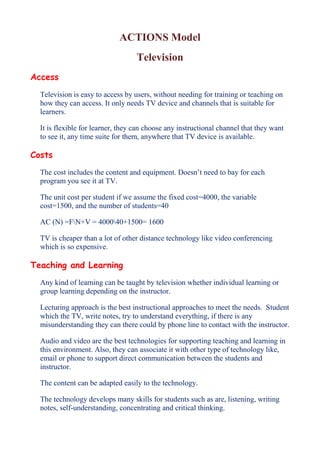Applying actions model de technologies (e.g., printed materials, c ds, tv, internet)
- 1. ACTIONS Model Television Access Television is easy to access by users, without needing for training or teaching on how they can access. It only needs TV device and channels that is suitable for learners. It is flexible for learner, they can choose any instructional channel that they want to see it, any time suite for them, anywhere that TV device is available. Costs The cost includes the content and equipment. DoesnÔÇÖt need to bay for each program you see it at TV. The unit cost per student if we assume the fixed cost=4000, the variable cost=1500, and the number of students=40 AC (N) =FN+V = 400040+1500= 1600 TV is cheaper than a lot of other distance technology like video conferencing which is so expensive. Teaching and Learning Any kind of learning can be taught by television whether individual learning or group learning depending on the instructor. Lecturing approach is the best instructional approaches to meet the needs. Student which the TV, write notes, try to understand everything, if there is any misunderstanding they can there could by phone line to contact with the instructor. Audio and video are the best technologies for supporting teaching and learning in this environment. Also, they can associate it with other type of technology like, email or phone to support direct communication between the students and instructor. The content can be adapted easily to the technology. The technology develops many skills for students such as are, listening, writing notes, self-understanding, concentrating and critical thinking.
- 2. Interactivity and User-friendliness This technology enables synchronies interaction, and it is easy to use and learn. We can say it is user friendly technology. Organizational Issues The organization require technical support, continues maintenance, and production team to create the instructional materials. I don't think that there are any barriers to using this technology successfully within the institution except bower failure which affect the learning process. The changes that need to be made within the organization to incorporate the technology are to provide each classroom with TV device. Novelty This technology is new comparing to OHP or radio. TV has a lot of technical capabilities such as, can deliver to long distance, has a lot of channels which give the learners the opportunities to choose the most suitable for them. Speed The process of creating courses takes a lot of time. On the other hand distributing the content is very fast. It is difficult to change the material that delivered by television.


